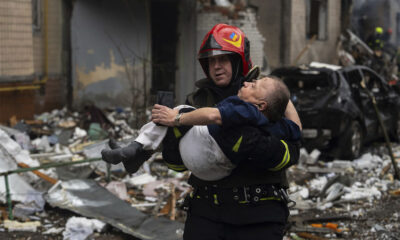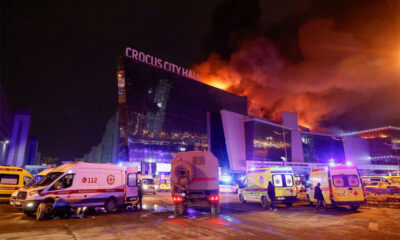International
Ukrainian Regulator Accuses Russia of Committing ‘Act of Nuclear Terrorism’

A Ukrainian nuclear regulator is accusing Russia of bombing a research facility containing a reactor and fuel cells, an action it considers “an act of nuclear terrorism.”
The Thursday rocket attack against the Kharkiv Institute of Physics and Technology, which occurred around 8:20 p.m. local time, marks at least the third time that Russian forces have attacked Ukraine’s nuclear sites. Observers worry that such attacks could hint at Russia’s willingness to use nuclear retaliation to gain an upper hand in its invasion.
“Once again, the Russian Federation has committed an act of nuclear terrorism!!!” the State Inspectorate for Nuclear Regulation of Ukraine announced in a March 10 press release, according to Google Translate.
The regulator said that it is still surveying the full damage from the attack, which resulted in a fire. Prior to Russia’s invasion, the reactor’s core was loaded with fresh nuclear fuel cells, the regulator added in a report.
However, even though locals fear a potential “large-scale ecological disaster” from the attack, according to The Independent, a large nuclear accident at the institute is unlikely because the institute’s reactor lacks the neutrons needed to activate the fuel cells as well as any highly enriched uranium onsite, nuclear analyst Matthew Bunn told Physics Today.
The Ukrainian regulator added that a March 6 Russian attack on the institute damaged its air conditioner cooling systems and left surface damage on the institute’s main installation as well as its pump and cooling tower building.
The International Atomic Energy Agency (IAEA) confirmed that the March 6 attack resulted in no increased radiation levels though, Newsweek reported.
On March 3, Russia attacked the Zaporizhzhia Nuclear Power Plant, Europe’s largest nuclear power plant. The attack hit a building adjacent to six reactors, resulting in a fire that was soon extinguished. None of the plant’s security or safety systems were compromised, and no reactors were hit.
Soon after the attack, Russian forces surrounded the plant, and the plant eventually resumed normal functioning. Russia later blamed Ukrainian saboteurs for starting the fire at the plant.
READ ALSO:
- Lagos-Ibadan train runs out of diesel, stops midway, passengers complain
- Many killed in tanker explosion around MFM on Lagos-Ibadan Expressway
- MC Oluomo pulls out of NURTW national body
Ukrainian President Volodymyr Zelensky said that Russia resorted to “nuclear terror” in attacking the plant. Ukraine’s Minister of Foreign Affairs Dmytro Kuleba tweeted that if the plant blew up, it would be 10 times worse than the 1986 Chernobyl nuclear disaster. He urged the Russian military to cease fire immediately.
However, one nuclear researcher was doubtful that a fire at a nuclear plant could set off a radioactive disaster.
“A single fire located somewhere on the same site as a nuclear power plant cannot feasibly trigger a meltdown,” Edward Obbard, a senior lecturer and nuclear engineering program coordinator at The University of New South Wales in Australia, told the Australian Science Media Centre.
Obbard and other nuclear experts said that a greater risk would be a direct explosion upon a reactor or spent fuel pool by explosive ordnance, which could release radioactive material.
Similarly, damage to a nuclear plant’s cooling systems could result in the nuclear reactor fuel getting so hot that it burns through its containment chamber, causing a nuclear meltdown and a widespread release of radiation, Newsweek reported.
Though U.S. Energy Secretary Jennifer Granholm said there was no indication of elevated radiation levels at the plant, the U.S. Department of State announced that it was “assessing” whether the attack constituted a war crime. The United Nations also convened an emergency meeting after the Zaporizhzhia attack to discuss its implications.
After its invasion, Russian forces also took control of Chernobyl, the site of the 1986 nuclear disaster that killed 31 people and left radioactive pollution in the region.
Near the beginning of the invasion, Russian President Vladimir Putin also commanded his military to raise the readiness level of his nation’s nuclear forces. The vague command alarmed international observers, but others have doubted that Russia will risk any sort of nuclear attack.
Olga Oliker—the European program director for the International Crisis Group, a think tank on global crises—believes that Russia would only use a nuclear weapon if it found itself in a direct war with NATO forces. Oliker said it was “unlikely” that Russia would use one against Ukraine.
Other experts have doubted that Putin would deploy nuclear weapons because of their toxic effect on the region.
U.S. President Joe Biden has said that Americans shouldn’t worry about the possibility of a nuclear war with Russia. Both the U.S. and the North Atlantic Treaty Organization (NATO) have said there is no need to change their own nuclear alert levels, despite Putin’s command.
However, in 2018, the Pentagon warned in its nuclear posture review that Russia could use a battlefield nuclear weapon to “‘de-escalate’ a conflict on terms favorable to Russia.” That is, it could feasibly use a small-range nuclear weapon to get its enemy to stop fighting back.
Putin could also launch a nuclear weapon if his military received a false alarm about another nation deploying a nuclear assault, Jeffrey Lewis, a senior scholar at the Middlebury Institute of International Studies at Monterey, told NPR.
Newsweek contacted the IAEA for comment.
Newsweek
International
Scammers steal over $3.4bn from older Americans – FBI report

Scammers steal over $3.4bn from older Americans – FBI report
Scammers stole more than $3.4 billion from older Americans last year, according to an FBI analysis issued Tuesday, indicating a spike in losses caused by increasingly sophisticated criminal tactics used to deceive the vulnerable into giving up their life savings.
Losses from scams reported by Americans over the age of 60 increased 11% last year compared to the previous year, according to the FBI.
Investigators are warning of an increase in brazen bank account-draining operations that entail deploying couriers in person to collect cash or gold from victims.
“It can have a devastating impact on older Americans who lack the ability to go out and make money,” said Deputy Assistant Director James Barnacle of the FBI’s Criminal Investigative Division. “People lose all their money. Some people become destitute.”
Last year, the FBI received more than 100,000 complaints from victims of scammers over the age of 60, with over 6,000 individuals losing more than $100,000.
It comes after a significant increase in reported losses by older Americans in the two years following the 2020 coronavirus epidemic, when people were confined to their homes and easier to reach over the phone.
Barnacle stated that investigators are finding organised, transnational criminal enterprises targeting older Americans through a variety of schemes, such as romance scams and investment frauds.
READ ALSO:
- 16 passengers burnt to death on Enugu road accident (PHOTOS)
- Multichoice shuns court order, proceeds with increase of DSTV, Gotv packages
- Ogun frees 49 inmates to decongest prisons
Last year, the most common type of fraud reported by older individuals was tech support scams, in which scammers impersonate technical or customer care staff over the phone.
In one such scam, which authorities say is becoming more popular, criminals impersonate technology, banking, and government officials to convince victims that foreign hackers have infiltrated their bank accounts and that they should transfer their funds to a new account that the scammers secretly control.
According to the FBI, between May and December, there was an increase in scammers utilising live couriers to steal money from victims who were fooled into believing their accounts had been hijacked.
In those circumstances, scammers inform victims that their bank accounts have been compromised and that they must sell their possessions for cash or purchase gold or other precious metals to secure their savings. The fraudsters then arrange for a courier to collect it in person.
“A lot of the fraud schemes ask victims to send money via a wire transfer or a cryptocurrency transfer. When the victim is reluctant to do that, they’re given an alternative,” Barnacle said. “And so the bad guy will use courier services.”
According to prosecutors, an 81-year-old Ohio man shot and killed an Uber driver who he believed was attempting to rob him after receiving fraudulent phone calls earlier this month.
The man had been receiving calls from someone claiming to be an officer from the local court and demanding money.
The Uber driver had been instructed to get a package from the man’s residence, a request that officials believe was made by the same hoax caller or an accomplice.
The enormous losses to older Americans are most likely an underestimate. Only roughly half of the more than 880,000 complaints submitted to the FBI’s Internet Crime Complaint Centre last year included information about the victim’s age.
Scammers steal over $3.4bn from older Americans – FBI report
International
Gaza: Protesters clash at UCLA, police arrest pro-Palestine demonstrators at Columbia University
Gaza: Protesters clash at UCLA, police arrest pro-Palestine demonstrators at Columbia University
Violent skirmishes broke out on Wednesday on the campus of the University of California, Los Angeles (UCLA) between pro-Palestinian protesters and a group of counter-demonstrators, a live video coverage by a US broadcaster revealed.
According to the UCLA student publication Daily Bruin, supporters of Israel attempted to knock down a pro-Palestinian protest campsite on campus.
Police were responding to UCLA Chancellor Gene Block’s call for assistance, said Zach Seidl, Los Angeles Deputy Mayor of Communications, on X.
READ ALSO:
- UN warns Israel assault on Gaza’s Rafah on ‘immediate horizon’
- Gaza: Israeli PM Netanyahu says Rafah attack will happen despite deal
- Gaza: Israeli PM Netanyahu says Rafah attack will happen despite deal
The October 7 attack on southern Israel by Hamas terrorists from Gaza, followed by an Israeli offensive on the Palestinian territory, has sparked the largest outpouring of US student action since the 2020 anti-racism rallies.
Aerial footage from KABC, an ABC affiliate, showed people using sticks or poles attacking wooden planks set up as a temporary barricade to defend pro-Palestinian protesters, some of whom held placards or umbrellas.
Late on Tuesday, New York City police detained scores of pro-Palestinian activists holed up in an academic building on Columbia University’s campus in New York and dismantled a protest encampment that the Ivy League school had attempted to destroy for nearly two weeks.
Gaza: Protesters clash at UCLA, police arrest pro-Palestine demonstrators at Columbia University
Reuters
International
UN warns Israel assault on Gaza’s Rafah on ‘immediate horizon’
UN warns Israel assault on Gaza’s Rafah on ‘immediate horizon’
UNITED NATIONS, April 30 (Reuters) – The United Nations on Tuesday warned that an Israeli assault on Rafah in the Gaza Strip was “on the immediate horizon” and that “incremental” progress by Israel on aid access to the enclave could not be used to prepare for or justify an operation.
U.N. Secretary-General Antonio Guterres appealed for states with influence over Israel “to do everything in their power” to prevent an Israeli assault on Rafah in southern Gaza, where more than 1.2 million displaced Gaza Palestinians are sheltering.
Israel’s Prime Minister Benjamin Netanyahu vowed on Tuesday to go ahead with a long-promised assault, whatever the response by Hamas to latest proposals for a halt to fighting in the nearly seven-month-long war and a return of Israeli hostages.
“The world has been appealing to the Israeli authorities for weeks to spare Rafah, but a ground operation there is on the immediate horizon,” said U.N. aid chief Martin Griffiths in a statement. “The simplest truth is that a ground operation in Rafah will be nothing short of a tragedy beyond words.”
Israel pledged nearly a month ago to improve aid access to the enclave of 2.3 million people after U.S. President Joe Biden demanded steps to alleviate the humanitarian crisis, saying the U.S. could place conditions on support if Israel did not act.
Guterres told reporters that there had been “incremental progress” toward averting “an entirely preventable, human-made famine” in northern Gaza, but much more was urgently needed.
READ ALSO:
- Gaza: Israeli PM Netanyahu says Rafah attack will happen despite deal
- Gaza: Israeli PM Netanyahu says Rafah attack will happen despite deal
- Georgia rocked by clashes over ‘foreign agent’ bill
“These improvements in bringing more aid into Gaza cannot be used to prepare for or justify a full-blown military assault on Rafah,” Griffiths said.
Guterres specifically called on Israel to follow through on its promise to open two crossings to the north.
“A major obstacle to distributing aid across Gaza is the lack of security for humanitarians and the people we serve. Humanitarian convoys, facilities and personnel, and the people in need must not be targets,” Guterres told reporters.
NO ALTERNATIVE TO LAND
A U.N.-backed report in March said famine was imminent and likely by May in northern Gaza, and could spread across the enclave by July. Guterres said the most vulnerable in the north “are already dying of hunger and disease.”
When asked what leverage the U.S. could use over its ally Israel to boost aid access and avert a Rafah assault, Guterres said: “It is very important to put all possible pressure in order to avoid what would be an absolutely devastating tragedy.”
U.S. Secretary of State Antony Blinken has said he will discuss with Netanyahu on Wednesday measures that Israel still needs to take to increase the flow of aid into Gaza.
“I strongly encourage the government of Israel and the Hamas leadership to reach now an agreement,” Guterres said. “Without that, I fear the war, with all its consequences both in Gaza and across the region, will worsen exponentially.”
The U.N. is in talks with the U.S. about a floating pier it is constructing to allow maritime aid deliveries to Gaza from Cyprus. Guterres said: “We welcome aid delivery by air and sea, but there is no alternative to the massive use of land routes.”
Israel’s Deputy U.N. Ambassador Jonathan Miller said last week that Israel continued “to elevate and step up” its aid support and that there had been substantial results with a “dramatic increase” in the volume of aid over the past several months.
Israel is retaliating against Hamas in Gaza over an Oct. 7 surprise attack on southern Israel led by the militant group.
Israel says about 1,200 people were killed and more than 250 people were taken hostage in the assault. Gaza health authorities say Israel has killed more than 34,000 people in its offensive in Hamas-run Gaza since then.
UN warns Israel assault on Gaza’s Rafah on ‘immediate horizon’
Reuters
-

 metro2 days ago
metro2 days agoLabour Day: Nigerian workers are dedicated, resilient, says NURTW leader
-
 Auto1 day ago
Auto1 day agoAppeal court takes over NURTW case as NIC withdraws
-

 News2 days ago
News2 days agoLabour-FG face-off imminent as NLC rejects new salary increase
-

 News2 days ago
News2 days agoFG approves salary increase for civil servants, military, police
-

 International2 days ago
International2 days agoBinance founder bags jail term in US
-

 metro3 days ago
metro3 days agoWoman arrested in Ogun after husband commits suicide
-

 metro19 hours ago
metro19 hours agoSecurity forces, vigilantes arrest kidnapper terrorising communities in Kogi
-
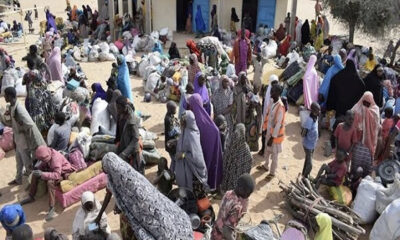
 News2 days ago
News2 days agoFG set to repatriate 20,000 Nigerians from Chad, Cameroon

